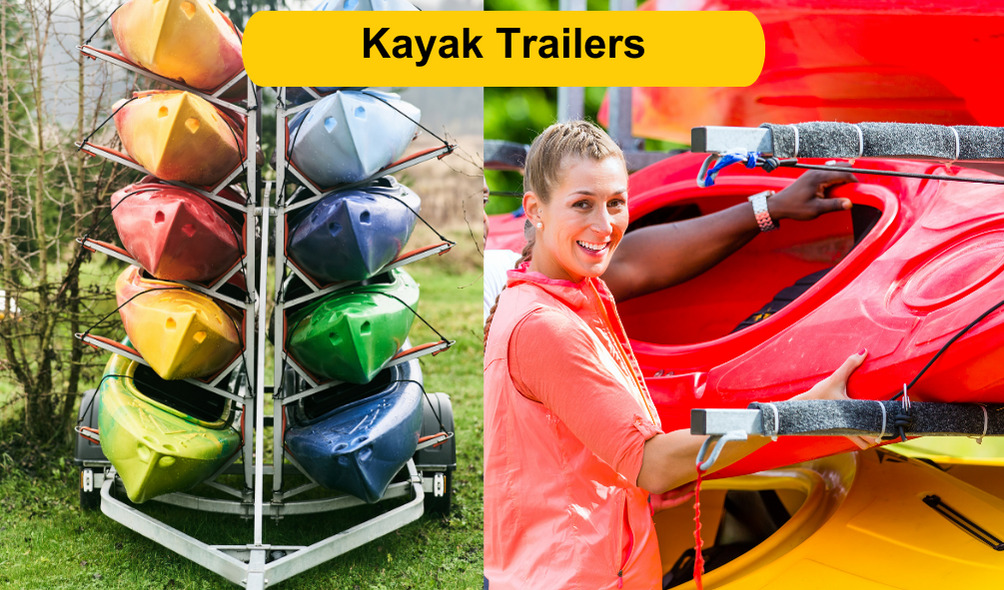Best Kayak Trailers | Types, Benefits & Buying Guide
Kayak trailers are the perfect way to get out and explore the outdoors. With plenty of storage space and the ability to transport your kayak with ease, they make outdoor adventures more enjoyable.
With a wide range of features, including adjustable tie-downs and multiple storage compartments, they provide a safe and secure way to transport your kayak.
Types of Kayak Trailers
Kayak trailers come in various types to suit different needs. Open trailers are an economical option, providing an easy way to transport one or more kayaks.
Enclosed trailers offer the added benefit of protecting kayaks from the elements, making them a great choice for long-distance trips. For those looking to make a statement, custom trailers can be personalized with an array of features and colors.
Open Trailers
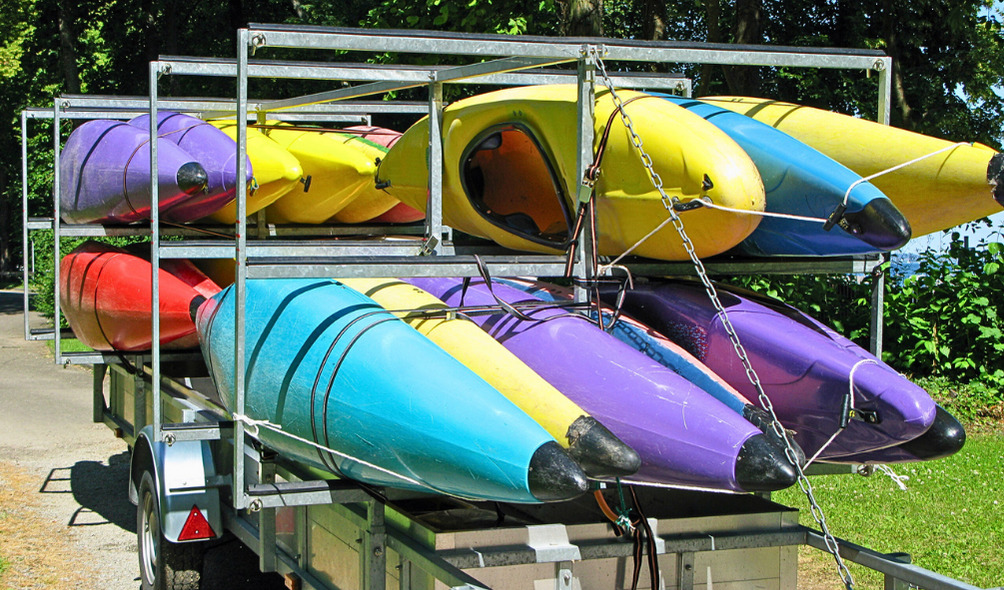
For those who like things open and accessible, an open trailer is the perfect choice. These trailers come in a range of sizes and configurations, designed to fit any type of kayak or canoe. Open trailers provide plenty of storage space, making them ideal for trips that require a lot of gear. With an open trailer, you can easily load and unload your kayak or canoe, as well as any other items needed on your journey.
The open-style trailer is designed to be lightweight and easy to tow. The frame is made from a sturdy, rust-resistant material, and the sides are usually made from a mesh-like material that ensures maximum ventilation to keep your gear dry and protected.
The trailer also has a hitch, so you can easily hook it up to any type of vehicle for towing. Additionally, it has strong, adjustable tie-down straps to keep your kayak or canoe securely in place while you travel.
Enclosed Trailers
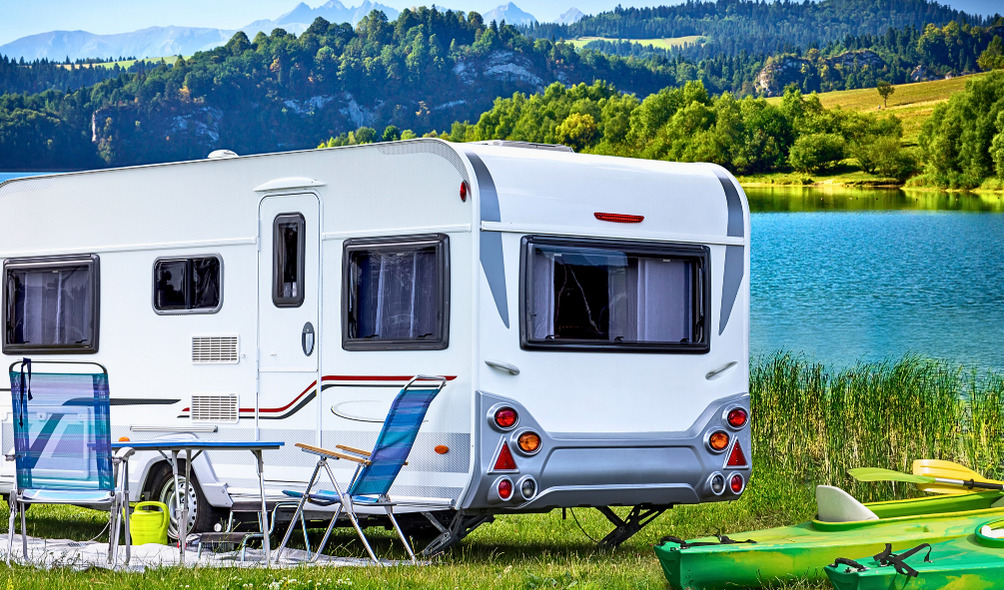
Transitioning to the next type of kayak trailer, enclosed trailers provide a higher level of protection and security for transporting your kayaks. These types of trailers are made up of a metal frame that is covered with a sturdy, waterproof tarp. This tarp helps to keep the kayaks safe from rain, hail, snow, wind, and other inclement weather.
The tarp can also be removed for easy access to your kayaks when needed. Many enclosed trailers also come with a lockable latch to help deter thieves.
The enclosed trailers are typically more expensive than the open trailers, but they provide added protection for your kayaks. They are also more aerodynamic when traveling at higher speeds, which can help with fuel efficiency.
They come in a variety of sizes and can accommodate anywhere from one to twelve kayaks. This makes them great for transporting multiple kayaks or for larger groups that need to transport a lot of gear.
Benefits of Owning a Kayak Trailer
Having a kayak trailer offers a number of key benefits, such as convenience, security, and flexibility. Loading and unloading kayaks is made easier by a trailer, which provides a safer and more comfortable experience,
while also allowing for increased storage capacity. An added bonus is that they often come with a locking system, allowing owners to rest easy knowing their prized possessions are securely locked away.
Convenience
Undoubtedly, the convenience of owning a kayak trailer is one of the major advantages. With a kayak trailer, transporting a kayak to the water can be done with ease and efficiency. As such, the trailer eliminates the need to carry a heavy and unwieldy kayak by hand. Instead, kayakers can simply use the trailer to navigate their kayak to their desired destination.
Moreover, the kayak trailer offers an additional convenience: the ability to transport more than one kayak at a time. Instead of having to make multiple trips with a single kayak, kayakers can now transport multiple kayaks at once with a kayak trailer. This saves time and energy, allowing kayakers to focus their energy on other aspects of their excursion.
Security
The safety and security that a kayak trailer can provide is an undeniable benefit for any kayaker. Boats of any size are notoriously difficult to transport, and a kayak trailer helps to ease the burden. By attaching the kayak to the trailer, the chances of it being stolen or damaged are greatly reduced.
The trailer also has additional security features, such as waterproof locks, to ensure that the kayak and all its components stay safe and secure. Trailers come in a variety of sizes and can be customized with additional features
such as lighting and extra storage space, allowing kayakers to tailor their trailer to their needs. This added protection allows kayakers to have peace of mind when traveling, knowing that their kayak is safe and secure.
Costs of Kayak Trailers
For those interested in purchasing a kayak trailer, the initial cost is an important factor to consider. DIY kits are also available, offering a more affordable option for those looking to build their own trailer, while installation costs may vary depending on the type of kayak trailer purchased.
Initial Cost
One thing to consider when purchasing a kayak trailer is the initial cost. There is a wide range of prices depending on the trailer you choose. For instance, a simple steel frame trailer with no customization can be found for around $500,
while a higher-end model with many features such as a corrosion-resistant frame, torsion axle suspension, and a lightweight aluminum frame will cost more. Additionally, there are several different types of trailers to choose from, including open trailers, closed trailers, and custom trailers.
When considering your budget, it is important to factor in the cost of accessories, such as bike racks, lights, and extra storage. Some companies also offer DIY kits for those who want to build their own trailer.
These kits come with all the necessary parts and instructions to build a trailer, and they typically cost around $300 or less. Finally, depending on the complexity of the installation, there may be additional labor costs when installing a trailer.
Trailer Sizing
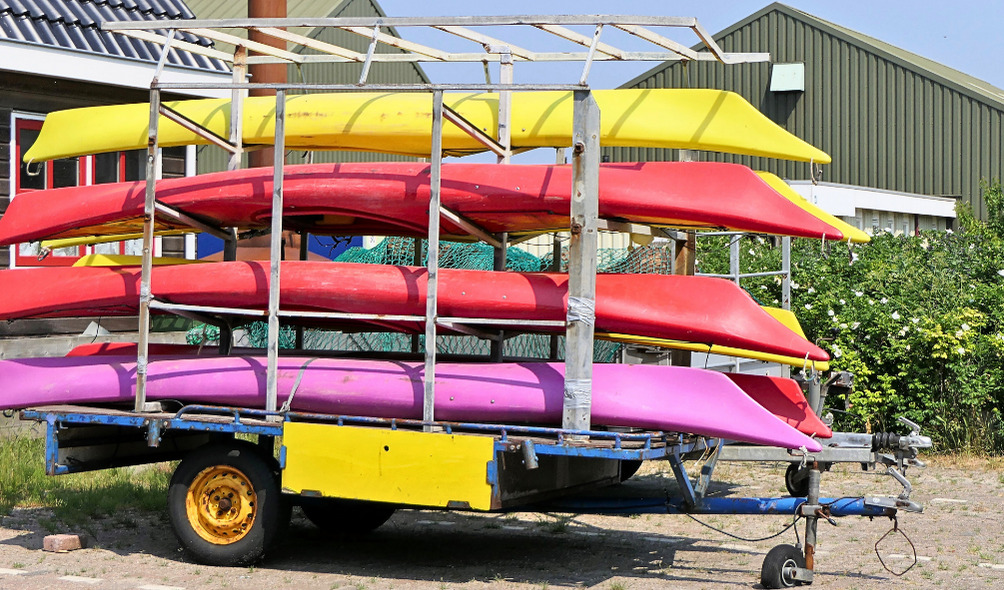
When considering trailer sizing, length and width are two important factors. The width of the trailer affects the cargo that can be safely transported, while the length affects the stability of the trailer when on the move. Additionally, the weight capacity should be taken into account to ensure the trailer can safely transport all of the necessary cargo.
Length and Width of Trailer
Choosing the right size trailer for your kayak is essential for an enjoyable and safe journey. The length and width of the trailer must be considered to ensure a snug fit and efficient transport. The length of the trailer should be slightly longer than the kayak itself, while the width should be slightly wider than the kayak.
The trailer must also be capable of supporting the weight of the kayak and any additional items you may be bringing along. The longer and wider the trailer is, the more weight it can support. When selecting a trailer for your kayak, it is important to double-check the measurements of both the kayak and the trailer to ensure an appropriate fit.
Trailer Weight
The weight capacity of a trailer is determined by several factors, such as its size and construction. The maximum load capacity of the trailer must be taken into consideration to ensure that it is able to safely transport the intended load. Lastly, proper weight distribution must be observed to ensure the trailer is not overloaded and to maximize its stability.
Weight Capacity of Trailer
When selecting a trailer, weight capacity is a critical element in the decision-making process. The trailer must be able to handle a maximum load capacity that includes the weight of the trailer itself, the cargo, and any passengers. Knowing the weight capacity of the trailer is essential to ensuring a safe and successful trip.
It’s important to know the weight capacity of the trailer before selecting it as the capacity can vary greatly. Trailers can range from a small utility trailer that can carry a few hundred pounds to a large, heavy-duty trailer that can haul several tons. It’s essential to understand the weight capacity of the trailer to ensure that it can safely haul the intended cargo and passengers.
When selecting a trailer, research the weight capacity and ensure that the trailer will meet the needs of the job. Knowing the weight capacity before selecting a trailer is the best way to ensure that it will be safe and successful for the intended purpose.
Vehicle Requirements
Considering vehicle requirements, towing capacity is of utmost importance for ensuring the safe transport of large, heavy loads. Additionally, weight capacity should also be taken into account, as it is necessary to ensure the vehicle can handle the
weight of the load and any additional cargo. Finally, towing capacity should be closely monitored to ensure the vehicle can safely and securely transport cargo.
Towing Capacity
To take towing capacity to the next level, it’s important to consider the weight and size of the vehicle you’ll be towing. Knowing the maximum towing capacity for your vehicle will ensure you don’t overload it, leading to a safer, smoother ride.
The towing capacity of a vehicle can be affected by its size, power, and overall design. For instance, a larger vehicle with a powerful engine and modern suspension may be able to tow heavier loads than a smaller vehicle with a less powerful engine and a standard suspension. Additionally, some vehicles are designed specifically for towing, making them even more capable than other vehicles.
Before towing, it’s important to check the weight of your trailer and the towing capacity of your vehicle. Doing so will help ensure that you don’t exceed the limits of your vehicle and have a safe, comfortable experience.
Maintenance
Maintaining a car requires attention to many details. Tire pressure needs to be regularly checked and adjusted so that the car can effectively grip the road and provide a smooth ride.
Lubricants should also be regularly applied to the moving parts of the car to ensure it runs efficiently and without noise. Lastly, tires should be inspected for wear and tear to ensure a safe and steady ride.
Tire Pressure
After ensuring that your vehicle is up to the necessary standards to get you safely from point A to point B, regular maintenance is key to keeping it running smoothly.
The tires are an essential component that should be checked regularly. Especially with regards to tire pressure, making sure to check the pressure and fill it as needed is a crucial part of regular maintenance.
A tire with inadequate pressure can lead to any number of issues, both in terms of performance and safety. Poorly inflated tires can affect the handling of the car, leading to a decrease in overall stability.
This can be especially dangerous on wet roads, where a lack of tire pressure can increase the chances of hydroplaning. Additionally, underinflated tires can increase the chances of a blowout, leading to a hazardous situation.
On the other hand, tires that are overinflated can lead to decreased contact with the ground, resulting in a bumpy and uncomfortable ride. It can also cause the tires to wear unevenly, leading to a need for an earlier replacement than necessary. Therefore, it is important to regularly check the tire pressure to ensure that the tires are properly inflated.
Lubrication
After ensuring that all of the vehicle’s requirements are met, it is essential to maintain the vehicle to keep it running efficiently and safely. One of the most important parts of maintenance is lubrication. Lubrication helps to keep the engine running smoothly and prevents premature wear and tear on parts.
Lubrication is also essential for protecting the engine from corrosion and rust. Rust and corrosion can lead to the deterioration of engine components and, in extreme cases, can cause the engine to seize up and fail. Properly lubricated parts help to protect the engine from these types of damages.
Another important aspect of lubrication is it helps to reduce friction and heat buildup in the engine. This helps to reduce the amount of energy and fuel needed to operate the engine, increasing its efficiency. Additionally, it helps to reduce the noise levels of the engine, making it quieter and easier to work with. All of these benefits are essential for keeping the vehicle running safely and efficiently.
Tire Pressure
With all the necessary parts of a car in place, the time for maintenance has come. Tire pressure is a critical part of vehicle maintenance, as it is a key factor in ensuring a safe and comfortable ride.
The tires of a car serve the same purpose as the soles of shoes—they provide the cushion between the car and the road. In addition to absorbing shock, they also provide traction to help the car make turns and stop. Tire pressure is crucial for these functions.
Tire pressure is the amount of air that is contained within the tire, and if the pressure is outside the manufacturer-recommended range, it can lead to a number of problems. Low tire pressure can cause the tire to overheat, leading to a blowout, while high tire pressure can lead to an uncomfortable ride and a greater risk of a flat.
It is important to keep an eye on tire pressure so that it remains at an acceptable level. Regularly checking the tire pressure and topping off the air when needed will ensure that the ride remains safe and comfortable.
Tips for Buying a Kayak Trailer
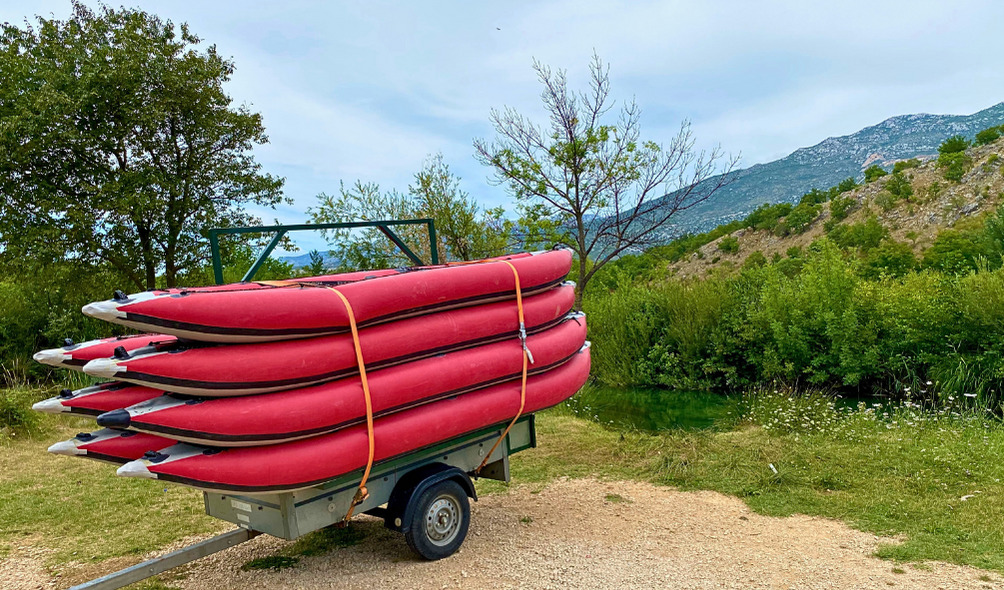
Researching different brands of kayak trailers is essential for finding the best option. Consider the cost and benefits of each to get the most value for your money. Accessories such as storage and lights should also be taken into account when purchasing a kayak trailer.
Research Different Brands
When it comes to purchasing a kayak trailer, researching different brands is a critical step. There are so many options on the market, that it can be overwhelming to choose one. To make the best decision, it’s important to look into the different features and benefits of each trailer.
It’s a good idea to read reviews from current and previous customers of the different trailer brands. This will give you a better understanding of the quality of the product and how satisfied other buyers have been. To get a clearer picture, it’s also helpful to compare ratings between different brands.
When researching different brands, it’s important to look at the materials used in the construction of the trailer. High-quality materials ensure that the trailer is durable and can withstand the elements. It’s also important to consider the weight capacity of the trailer.
Depending on the size and weight of your kayak, you may need a trailer with a higher weight capacity. Lastly, make sure to read the manufacturer’s warranty and return policy. While these are not the most exciting aspects of buying a kayak trailer, it’s important to be aware of them in case of any issues.
Consider the cost-benefit ratio.
Now that you have done your research on different brands of kayak trailers, the next step is to consider the cost vs. benefits of each one. It’s important to think about the features you need before making a purchase, as the prices can vary greatly depending on the size and materials used.
A lightweight option may be more affordable, but it may not be as durable or have all the features you need. A more expensive option might be made of higher-quality materials and have more features, but it may not fit your budget. Consider what you need from your trailer and weigh the cost against the benefits.
Conclusion
Time spent on the water is enriching and rewarding, but transporting a kayak or multiple kayaks can be a challenge. Kayak trailers provide an easy way to transport kayaks with convenience and safety.
By understanding the different types, benefits, costs, sizes, weights, and vehicle requirements, kayakers can choose a trailer that meets their needs. With proper maintenance, a kayak trailer can be a useful tool to provide beautiful moments on the water.
Kayak trailers can be found in a variety of sizes and prices to fit any kayaker’s budget. With careful consideration, the right kayak trailer can be a great addition to any kayaker’s lifestyle and provide years of use.

